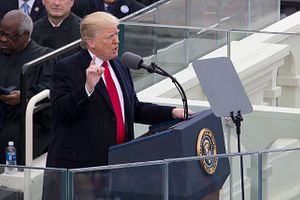Perceptions of the United States have worsened considerably across the Asia-Pacific region since Donald J. Trump’s inauguration as president earlier this year. According to a newly released survey by Pew Research Center, a think tank focused on public opinion analysis, favorability ratings toward the United States and confidence in the U.S. president have dropped considerably since the transition from the Obama administration to the Trump administration. The data holds considerable implications for U.S. policy in the region and there are several important takeaways for the current U.S. administration.
First, the Asia-Pacific is not an aberration in its decreased confidence in the U.S. leader and overall loss of favorability toward the United States. Globally, after a survey of 37 countries, 74 percent of respondents said they had no confidence in the U.S. president at the beginning of the Trump presidency, rising from just 23 percent at the end of the Obama presidency. Similarly, while 64 percent of respondents expressed favorable views toward the United States at the end of the Obama administration, just 49 percent did at the start of the Trump presidency.
Second, a closer look at the data reveals that the largest net differences in public confidence in the U.S. president were seen in crucial U.S. allies in the Asia-Pacific region. In South Korea, the difference between how confident respondents were that the U.S. president would “do the right thing regarding world affairs” moved from 88 percent under Obama to just 17 percent under Trump — a shift of 71 percentage points, the highest in the Asia-Pacific by far. Among Asian countries, Australia and Japan followed with net differences of -55 and -54 percentage points respectively (Australian respondents, at 48 percent, had the most unfavorable views of the U.S. overall in the survey). Other Asian states, including Indonesia, the Philippines, India, and Vietnam also showed a loss of confidence, but the drops were not nearly as drastic .
The lack of public confidence in Trump among these democratic U.S. allies will have important implications for foreign policy outcomes for the United States. Alliance coordination can be expected to grow tougher as leaders may find themselves unable to offer certain commitments to the Trump administration at the risk of facing public opinion at home. So far, South Korea appears to be the most likely case where this could be a problem, given the untested relationship between President Moon Jae-in and Trump. The two leaders will meet for the first time this week and their views on a range of issues — notably, the North Korea question — appear divergent. Trump’s relationship with Japanese Prime Minister Shinzo Abe is notably positive and his relationship with Australian Prime Minister Malcolm Turnbull improved after a rocky start.
Third, and finally, not all the news is bad. For all the loss of confidence in the U.S. leader himself, regional views of Americans remain largely positive across Asia. This is to say that while Trump has certainly eroded public confidence in the United States as a force for good in the region, Asians largely don’t hold unfavorable views of Americans (though Pew’s sample isn’t exhaustive).

































